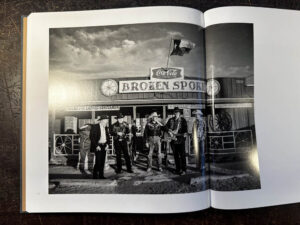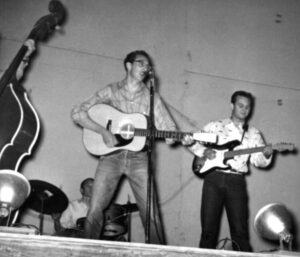RIP to the great Chris Strachwitz of Arhoolie Records. It’s impossible to overstate his importance or his influence in the world of music. That’s a mighty big statement, but it’s true.
Strachwitz was an immigrant from a small town southeast of Berlin that was part of Germany before World War II and part of Poland after the war. His family emigrated to the United States in 1947, where he attended school in Carpinteria and Claremont and eventually served in the US Army in the mid-1950s. Somewhere along the way, he was bitten by the sound of American music—jazz and blues in particular.
By the late 1950s, he began field recording, capturing Bay Area bluesman Jesse Fuller and saxophonist Sonny Simmons. He saved up to buy better recording equipment, and made a trip to Texas in 1959 looking to record bluesman Lightnin’ Hopkins. He didn’t find Hopkins on his first trip, but he made arrangements to come back the following year.
In 1960 he returned to Texas, and with the assistance of his friend Mack McCormick (deceased, recently in the news because of his eccentric nature and contentious Robert Johnson research), formed the record label Arhoolie Records. Strachwitz, along with McCormick, recorded several Texas bluesmen on that 1960 journey, including Mance Lipscomb, “Black Ace” Turner, “Li’l Son” Jackson, and “Whistling” Alex Moore. These artists were the first releases on a record label that would eventually span sixty years and hundreds of releases.
Strachwitz assisted a German filmmaker in 1963 on a film trip through the South, filming all manner of “folk” music, from blues to hillbilly to gospel to conjunto to street performers caught in their native element. It is from this movie that one can really feel what it must have been like for Strachwitz in the early days of musicology—digging around for street musicians in places where Yankees and foreigners weren’t welcome, convincing them to perform for the camera, recording music that most of the general public considered beneath contempt. The word “trailblazer” isn’t really adequate to describe what Strachwitz did in these early days, giving attention and importance to aspects of US musical culture that most would deem trash or garbage.
Strachwitz moved his label to Berkeley, and in 1966 recorded a local band called Country Joe and the Fish, and their “I Feel Like I’m Fixin’ to Die,” for which he received a portion of their song publishing. When the song was featured in the Woodstock movie, the publishing money that came in allowed him to purchase a building and set up his folk music empire, where he ruled for the next fifty-plus years.
Over those fifty years, Arhoolie existed not only as a record label for various types of folk musics (Strachwitz developed a particular interest in Mexican and Mexican American music, eventually owning the largest archive of such music in existence), but also the Down Home Records store, which was a mecca for fans (like yours truly) who went there to find the good stuff, the hard-to-find stuff. It was the sort of store where you might stumble on Dave Alvin looking through the book section, or up-and-coming folk music legends like Frank Fairfield digging through stacks of dusty 78 rpm records in the back. It was, and I hope it continues to be, a mecca for weirdos like myself.
It was always a thrill for me when I stopped in to Down Home Music. Chris always knew me and asked about my current musical doings. He was one of the few “folk” music people I’ve met who recognized that rockabilly was a legitimate American folk music. He had Dale Hawkins perform live in the store. He was always asking me about people like the Collins Kids. He was just that kind of a guy.
Time eventually caught up to him, and the legendary Chris Strachwitz passed away yesterday in Marin County, California. If you have any interest in the preservation of American musical history, instead of a moment of silence, I know he’d appreciate it if you blasted some Clifton Chenier, Maddox Brothers and Rose, Lightnin’ Hopkins, or any of the great music he promoted tirelessly through the decades.
Check out the film Down Home Music, a Journey through the Heartland 1963. What a magnificent legacy Chris Strachwitz leaves behind.





